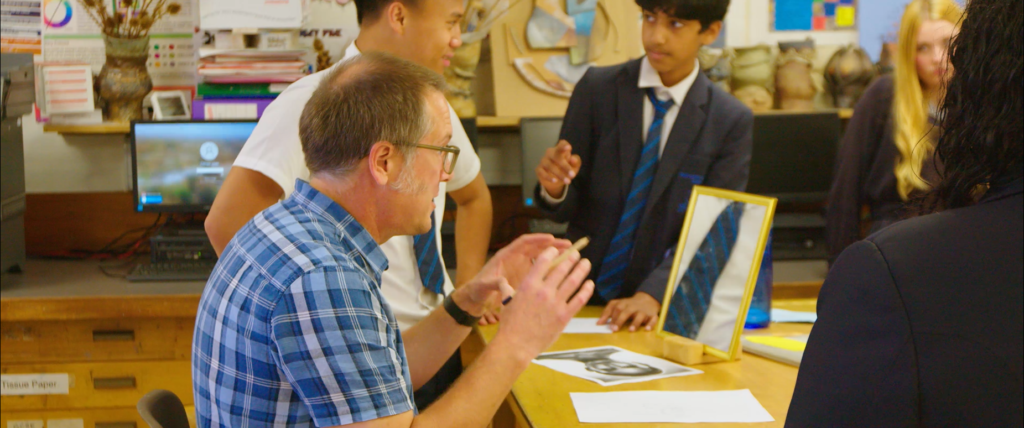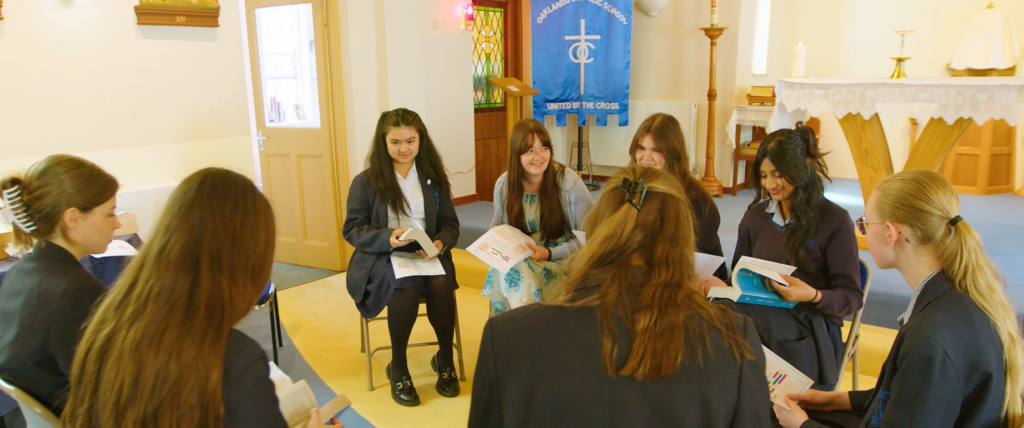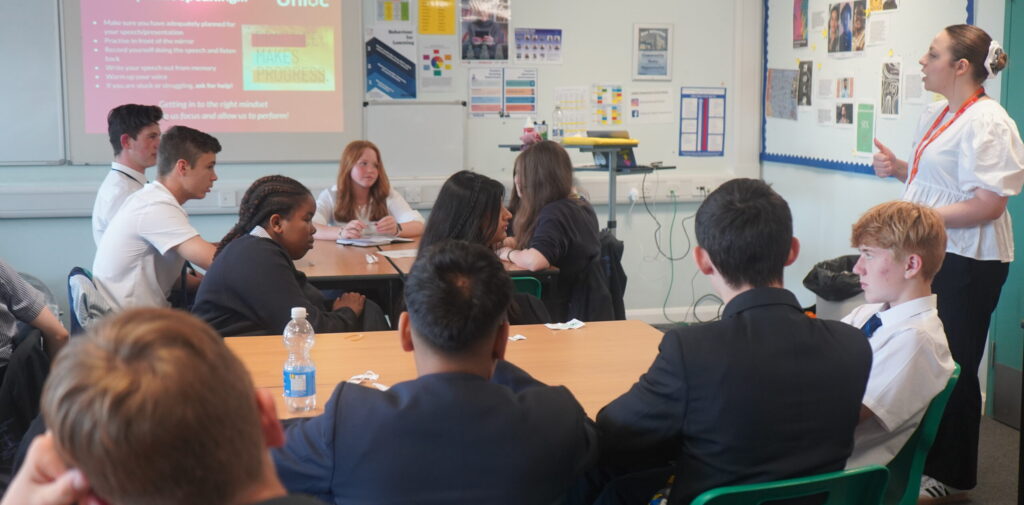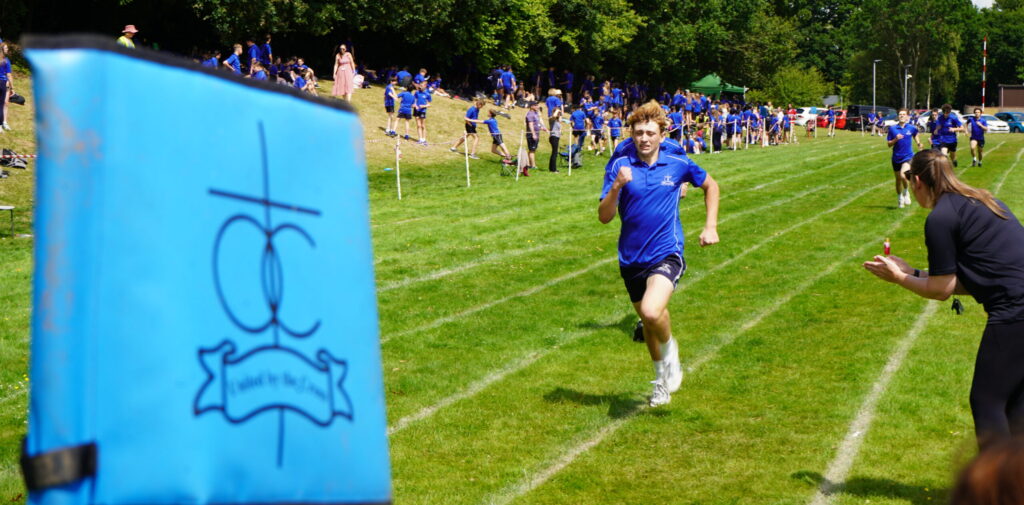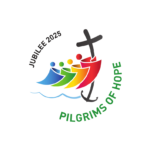At Oaklands the curriculum
“is how the school community makes explicit its goals and objectives, the content of its teaching and the means for communicating it effectively. In the curriculum, the school’s cultural and pedagogical identity are made manifest”
CONGREGATION FOR CATHOLIC EDUCATION
THE IDENTITY OF THE CATHOLIC SCHOOL FOR A CULTURE OF DIALOGUE
Should you wish to learn more about our curriculum, please contact Mrs S.Whyte – s.wyhte@oaklandscatholicschool.org – who is the Deputy Headteacher with the responsibility for our curriculum. The list of GCSE courses for 2023/25 are in this Y9 options booklet
Curriculum Intent
Our Mission Statement unifies our school community around the salvific mission of Jesus on the cross. We believe that every child has potential to be great. Therefore, our curriculum is characterised by excellence – providing opportunities for students to reach their full potential and prepare them for a world outside of school. Our curriculum is shaped cognisant of the needs of young people and ‘illuminated by the Gospel Message’.
We aim to foster the intellectual, social, creative, physical, moral and spiritual development of all our students. Oaklands students will grow up as determined, courageous and humble individuals who will embody the gospel values throughout their lives with a deep appreciation of the beauty of God’s world around them and with an understanding of Catholic social teaching.
It is our intention, that through the curriculum students will engage with the life and teachings of Jesus Christ and of the saints, regular participation in the Holy Mass is key in devolving this. Exposure to scripture develops understanding the spiritual and moral teachings of the Church and the study and practice of Catholic Social Teaching.
Catholic education, in all its forms, is a mission (inspired by Jesus Christ to ‘Go and Teach all Nations’ (Mt. 28.19); We want our students to be the best they can be, therefore our curriculum both formal and informal is not just a social or economic enterprise, it has higher purposes which relate to the formation of good people, of good citizens and of good Christians. it is a mission of personal transformation.
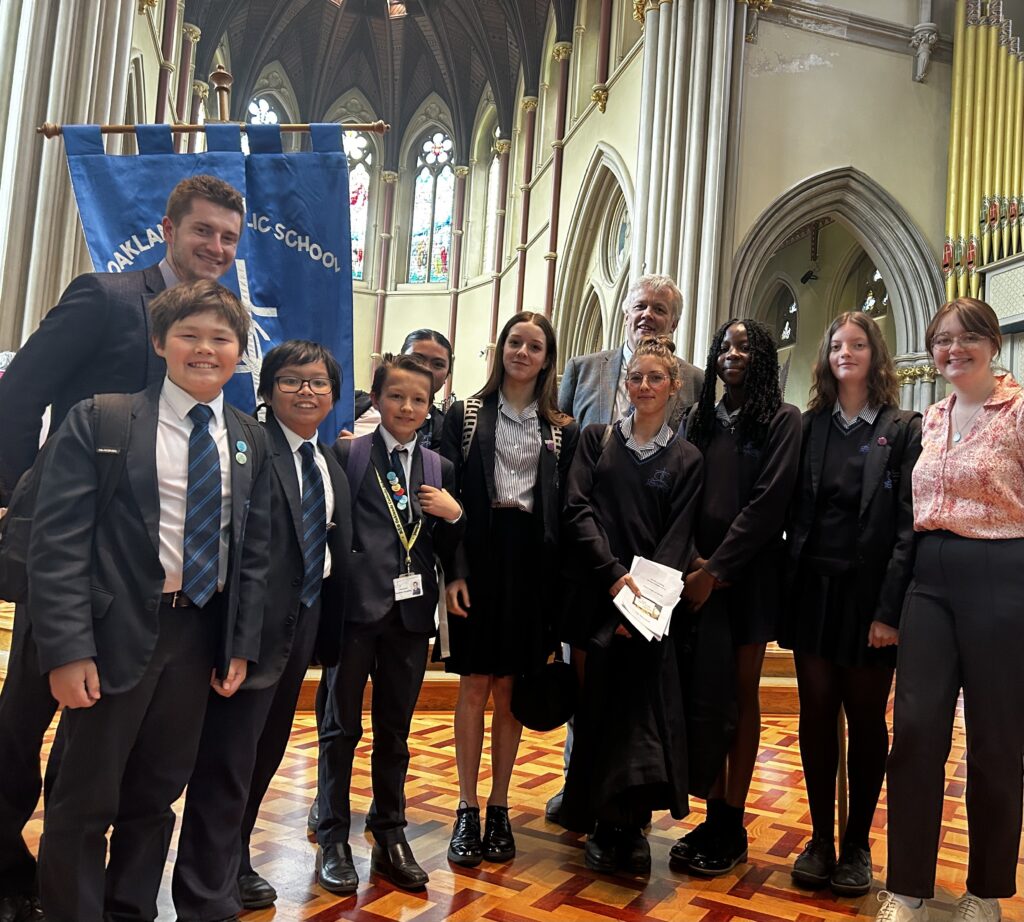
Our curriculum is underpinned by our mission statement so that students will experience:
Community: No-one gets Left Behind
• Be challenged and equipped to live and work in a complex and changing world
• Encouraged to respect the values of others and take responsibility for themselves and others in school and the wider community
• Be skilled in keeping themselves and others safe
Unity: United by the Cross
• Encounter the living God who is Jesus Christ revealing his transforming love and truth
• Adopt sound moral and ethical values and can contribute positively to society
• Be able to manage relationships and situations in a sensitive and productive manner
Opportunity: Potential for Greatness
- Aspire to be the best they can be.
- Achieve their potential in all areas of school life – spiritual, academic, creative, physical and emotional.
- Grow in self-esteem and resilience and have a sense of social and environmental responsibility.
To help our young people develop, we believe it is important for them to explore their talents and enable them to experience success and fulfill their potential. To this end, we offer a broad and balanced curriculum with a wide range of subjects where learning is organised so there is a sincere ongoing engagement between faith, learning and culture.
Through the curriculum, in its widest sense, we plan to instil virtues and values into all the students in our care. These virtues stem from the Beatitudes and have been well researched. They resonate with Catholic Social Teaching. As Catholics, we recognise the parallel between British values and Christian values – we therefore actively promote our Christian values as British values. This provides the vehicle to prepare our students for life in modern Britain.
Students are encouraged to regard people of all faiths, races and cultures with respect, embracing and celebrating ‘difference’ and understand that while different people may hold different views about what is ‘right’ and ‘wrong’, all people living in England are subject to its law.
We aim align Catholic Social Teaching with our curriculum. To support this, each department has a clear statement of its curriculum intent, implementation and impact. Additionally each department has its own curriculum map.
Whilst examination outcomes are important, we recognise that there is more to school than just this, it is also a rich and varied ‘pool’ of extra-curricular activities through the informal curriculum. The extra-curricular offer provides a space to encounter the living God who in Jesus Christ reveals his transforming love and truth in a unique way.
Our extra-curricular offer will provide students with an opportunity to explore interests and create broader perspectives. This offer will unlock passions in students they never knew they had, diversify their interests and subsequently broaden their view of the world. Our activities will provide opportunities to expand a student’s social network working alongside others whilst improving self-esteem and self-confidence. These opportunities will promote fun and provide something else to complement schoolwork. Additionally, the range of opportunities we offer will expose students to ‘real world’ skills. These skills include (but are not limited to) teamwork, prioritisation, problem solving and leadership.
We recognise that young people have differing needs, gifts and talents and we aim to meet these through a variety of curriculum support and intervention strategies across all year groups, including Gifted and Talented activities, learning mentors and study support as well as literacy or numeracy intervention programmes.
Curriculum Implementation
Religious Education is at the foundation of the entire educational process. For this reason, significant time is devoted to its delivery through all Key Stages. At Oaklands, we recognise that young people will be at different places in the spectrum of their faith and spiritual development. Some will belong to the Catholic tradition; others will be of other Christian denominations or other world faiths. Many may have no faith at all. Religious Education implemented through the RE curriculum and all subjects will support all young people in their personal journey. To this end, it offers opportunities for both evangelisation, proclaiming the Gospel message to all and catechesis, the deepening of existing faith commitments among believers, so it is central to all subjects.
Key Stage 3
We believe that Years 7 – 9 are very important building blocks to ensure success in later life. Students will build upon KS2 mastery and acquire skills and knowledge at this stage, which will support their success at Key Stage 4, and beyond irrespective of the pathways they choose.
Students develop the main key skills of literacy, communication, numeracy, team building as an integral part of the curriculum, together with learning and thinking skills, which allow them to flourish as independent learners. These skills and others are mapped across the curriculum.
All students follow a core curriculum in Year 7 to 9, which is delivered through a variety of mixed ability and ability grouped teaching with additional literacy and numeracy support for those who need it. All students study a full range of academic and creative subjects, which can be furthered at GCSE if chosen.
In the summer term of Year 9 students move to their GCSE options to maintain momentum for learning.
Key Stage 4
We offer a wide choice of subjects at KS4 so that students can choose from a range of accredited qualifications to suit a range of abilities, interests and learning styles. We recognise that for some students we may have to work closely with other providers to develop a curriculum offer so they achieve their potential – this may be at a cost for some of the key performance indicators, but is in the best interest of the student.
There is a general KS4 pathway, which is a requirement for able linguists but also available to all students. Each route is intended to meet the needs and aspirations of all students and provide progression to post-16 education or training and beyond.
We ensure that students follow a balanced curriculum, which will equip them to compete in a rapidly changing world. All students follow courses in English, Maths, Science, RE, History or
Geography. The vast majority of students are encouraged to take a modern foreign language. Students may opt to study triple science, depending on their aptitude for the subject.
Students are allocated additional time for English and Maths as these two subjects provide a foundation for all others (please refer to our Curriculum Policy for a full description of the allocation of curriculum time in Years 7 -13).
KS4 option blocks are designed around student choice with popular subjects in more than one option block. (please refer to our Curriculum Policy for the current option offer. Some options with smaller student numbers may be protected to safeguard curriculum balance and support the school ethos, for example Music. Please refer to Appendix 1 of the Curriculum Policy for the school policy on determining the viability of a group).
Subjects studied at KS4 all lead to accredited qualifications and support progression post-16.
Independent careers advice at key points helps to ensure that students are guided to towards the options and pathway which best suits their plans and aspirations. Students in KS4 are set according to academic ability across two bands with flexibility to move within the bands in core subjects. Options subjects are largely mixed ability.
Key Stage 5
At Key Stage Five, we provide students with the opportunity to follow programmes comprising of A-level and other accredited Level 3 options (please refer to our Curriculum Policy for the current option offer). Our focus is for our students to develop a greater sense of independence as part of a high challenge, high support community with student voice at its heart.
Students that have demonstrated at Key Stage 4 that they have the potential for further study, are able to choose from a wide range of subjects including both A levels and more vocational courses
(subject to demand, viability, staffing, timetabling and individual GCSE grades).
As part of the enrichment and tutorial programme in Years 12 and 13, students follow a curriculum based on careers advice that provides help, support and independent guidance. This supports every student in their post 18 pathway choice. This includes the selection of Higher Education courses and other alternatives such as high quality apprenticeships.
We consider that wider opportunities in the Sixth Form are essential to the holistic development of our all of our students. Examples of wider opportunities on offer include: leading as role models in the community both inside and outside school, being part of an active academic and pastoral mentoring programme that supports students in Key Stages 3 and 4 as well as being members of the Student Leadership Team representing student opinion and wishes across the school.
We pride ourselves on the level of academic and pastoral support given to our students. The Sixth Form central team and specialist form tutors work together to support, encourage and oversee the personal development and academic progress of all of our students in preparation for their individual futures, whether that is entry into the world of work, following an apprenticeship or preparing for university.
Impact
We are ambitious for high achievement and high standards across the school. Success is often described in terms of academic – high outcomes are for everyone. At Oaklands we award and reward students in many ways. As a diverse school community, we believe our students possess unique talents, skills and qualities. As such, they have the right to succeed, the right to recognise their own greatness and the right to develop who they are in a respectful and nurturing environment
The impact of the curriculum is measured in standards achieved, based against age related expectation, progress made and personal qualities acquired. The impact of our curriculum is seen in:
• High standards: consistently performing at above national.
• Students who are able to promote a Catholic world view
• Progress which builds incrementally year-on-year at a pace and momentum appropriate to the student
• Low levels of NEETs and good throughput to employment, apprenticeships and university
• Quality extra-curricular experiences, which are memorable, worthwhile and challenging.
• Teaching which is rigorous, personalised, innovative and student-centered.
• Students that are resilient, questioning, resourceful, and self-sufficient.
• Self-aware students, with well-formed characters, who have a thirst for learning and see it as a route to maximizing their life chances.
Means of Measuring Impact
The curriculum is regularly reviewed, developed, monitored and evaluated by the Headteacher, School Leadership and Management Team, external advisers and governors, leading to improvements and innovation.
Heads of department and subject leaders take responsibility for ensuring coverage, progression and standards through long and medium-term planning, promoting the subject and developing the teaching methodology and securing high quality resources. They regularly monitor and evaluate learning, teaching and the curriculum.
Planning is detailed, regular and collaborative and prepares teachers so they provide a coherent, personalised learning experience.
Assessment is both formative and summative and progress and attainment are regularly tracked and reported to parents.



